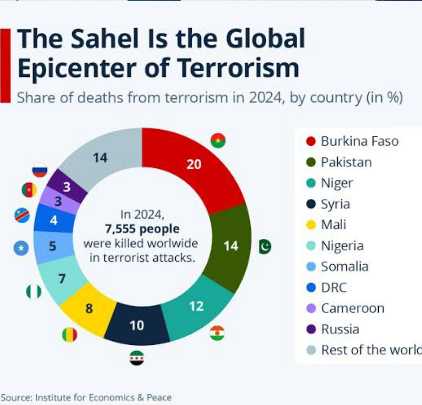Nigeria Ranks Sixth in Global Terrorism Index 2025: Defence Headquarters Responds
The 2025 Global Terrorism Index (GTI), released on March 5, 2025, has positioned Nigeria as the sixth most affected nation by terrorism, with a score of 7.658. This marks a shift from its previous eighth-place ranking in 2023 and 2024. The report highlights a concerning increase in terrorism-related fatalities within the country, recording 565 deaths in 2024, up from 533 in 2023 and 392 in 2022.
In response to these findings, the Defence Headquarters (DHQ) of Nigeria has offered clarifications, emphasizing that internal assessments may provide a more accurate depiction of the nation’s security landscape. Major General Markus Kangye, Director of Defence Media Operations, addressed the GTI report during a press briefing, suggesting that domestic evaluations might better reflect the realities on the ground. He posed a rhetorical question, comparing external reports to insights from those directly involved:
“Something is happening in my house. I’m the head of the house… someone else is reporting what is happening in my house to me. Which one would be more correct?”
Major General Kangye’s remarks underscore the DHQ’s perspective that internal reports, based on firsthand information, may offer a more precise understanding of Nigeria’s counter-terrorism efforts. He urged media professionals to critically assess and, when necessary, correct external narratives that might not fully capture the nuances of the nation’s security situation.
The GTI report also draws attention to the escalating activities of IS-Sahel, a terrorist group primarily active in the Liptako-Gourma region—the tri-border area of Burkina Faso, Mali, and Niger. In 2024, IS-Sahel expanded its operations into Algeria, Benin, and Nigeria, executing 16 attacks within Nigerian territory.
Furthermore, the report indicates a global uptick in terrorist activities, with the number of countries experiencing at least one terrorist attack rising from 58 to 66—the highest since 2018. This trend underscores the persistent and evolving nature of global terrorism, necessitating adaptive and comprehensive counter-terrorism strategies.
In light of these developments, the Nigerian military continues to intensify its efforts to combat terrorism and ensure the safety of its citizens. Major General Kangye highlighted ongoing operations aimed at neutralizing threats, particularly in regions affected by groups such as the Indigenous People of Biafra (IPOB) and its armed wing, the Eastern Security Network (ESN). He acknowledged that, despite these efforts, fear among residents persists, leading to compliance with unauthorized sit-at-home orders in certain areas.
The DHQ’s clarifications and the GTI’s findings collectively emphasize the complexity of Nigeria’s security challenges. While external reports provide valuable insights, the DHQ advocates for a balanced perspective that incorporates both external assessments and internal evaluations to accurately inform the public and guide policy decisions.

